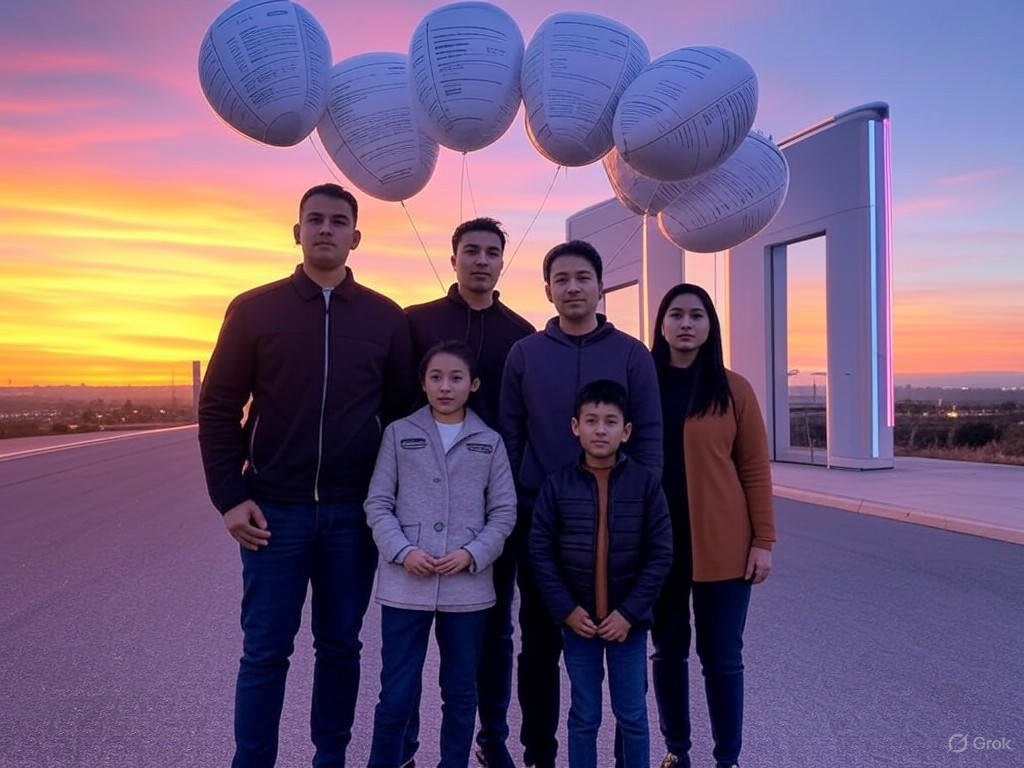
Immigrants Due Process: Trump’s Uncertainty on Rights Explained
Introduction: A New Era of Immigration Policy
Have you ever wondered how quickly policies can reshape lives? In 2025, the second Trump administration is transforming immigrant due process, creating a wave of uncertainty for millions. From bold executive orders to tightened border controls, immigrant due process is at the heart of these changes, affecting everything from family separations to legal protections.
This piece dives into the key shifts, exploring how these policies challenge fundamental rights and what it means for those building lives in the U.S. It’s a timely look at the balance between security and fairness in our immigration system.
Understanding Due Process for Immigrants
At its core, immigrant due process ensures that everyone, regardless of status, gets a fair shot in the legal system. This means basic rights like notice of proceedings, a chance to be heard, and access to counsel during immigration matters.
Imagine facing deportation without knowing why or having a voice—that’s what makes immigrant due process so vital. Key elements include:
- Notice of proceedings—Immigrants must receive clear information about hearings and charges to prepare their defense.
- Right to a hearing—This allows individuals to present their case before a judge, a cornerstone of justice in immigration law.
- Access to counsel—Though not government-funded, immigrants can hire lawyers to navigate complex cases.
- Appeal mechanisms—Options exist to challenge decisions, offering a safety net against errors.
Why does this matter? Without strong immigrant due process, the risk of unfair treatment skyrockets, impacting families and communities nationwide.
Trump’s Approach: Executive Power and Policy Shifts
Since early 2025, the Trump administration has unleashed a flurry of changes, reshaping immigrant due process through executive actions. These moves prioritize enforcement over traditional safeguards, raising questions about long-term consequences.
Key initiatives include aggressive removal operations, expanded local partnerships, and efforts to limit asylum access—all challenging the foundations of immigrant due process. For instance, new rules on birthright citizenship have sparked immediate backlash, testing the limits of constitutional rights.
- Aggressive enforcement targeting noncitizens, potentially bypassing full due process steps.
- Collaborations between federal and local authorities, which critics say blur civil rights lines.
- Restrictions on birthright citizenship via executive orders, adding uncertainty to immigrant families.
- Mandatory registration for undocumented individuals, often leading to quick deportations without adequate hearings.
- Tightened asylum rules, making it harder for refugees to seek protection under due process norms.
Case Study: The Birthright Citizenship Debate
On January 20, 2025, an executive order aimed to redefine birthright citizenship, directly threatening immigrant due process for newborns of noncitizen parents. This move landed in court almost instantly, with groups fighting to preserve these rights.
It’s a stark example of how policy shifts can create immediate chaos. Lawsuits have halted the order, but the underlying tension around immigrant due process persists, leaving families in limbo.
Key Changes Impacting Immigrant Due Process
1. Mass Registration and Its Risks
The new registration mandate forces undocumented immigrants to provide personal details, often under threat of penalties. This approach undermines immigrant due process by prioritizing speed over fairness, potentially leading to unwarranted detentions.
Think about it: What if registering meant facing immediate deportation without a proper hearing? Communities are reporting increased fear, as noncompliance could result in fines or arrests. It’s a policy that raises ethical questions about justice and equity.
- Enforced with criminal charges for non-compliance, eroding trust in the system.
- Leading to a surge in mistrust, where families avoid seeking help due to due process fears.
2. Restrictions on Legal Relief
Under Project 2025, protections for groups like Dreamers and TPS holders are on the chopping block, directly affecting immigrant due process. This blueprint calls for cutting visa programs and asylum pathways, leaving many without legal recourse.
Over 700,000 people with deep roots in the U.S. could lose their status overnight. How does this impact everyday life? It creates barriers to stability, making immigrant due process feel more like a luxury than a right.
- Endangering long-term residents and heightening the stakes for humanitarian cases.
- Forcing returns or denials that skip traditional due process steps, like thorough hearings.
3. Local Enforcement Expansion
The administration is pushing states to join federal efforts, potentially turning everyday police into immigration enforcers. This blurs the lines between criminal and civil law, challenging immigrant due process at the local level.
Concerns about racial profiling are rising, as this could lead to wrongful detentions without proper oversight. It’s a shift that might make communities less safe, not more.
Legal Battles and Immigrant Due Process Uncertainty
The courts have become a battleground for immigrant due process in 2025, with groups like the ACLU filing challenges against Trump’s policies. These cases question the extent of executive power and its impact on individual rights.
So far, judges have blocked some orders, but ongoing lawsuits keep immigrant due process in flux. What will this mean for future rulings? It could redefine how policies balance security and fairness.
- Immediate blocks on birthright challenges, preserving aspects of due process temporarily.
- Pending cases on asylum and registration, where outcomes will shape immigrant rights.
- Debates over local enforcement and its alignment with constitutional protections.
Effects on Communities: Navigating the Ambiguity
Immigrant due process changes are rippling through daily life, creating anxiety for families, employers, and schools. From job losses to disrupted education, the uncertainty is palpable.
Consider a hypothetical scenario: A parent with TPS fears a sudden revocation, separating them from U.S.-born children. Here’s how traditional safeguards compare to the new reality:
| Policy Area | Traditional Due Process | 2025 Changes |
|---|---|---|
| Birthright Citizenship | Protected by the 14th Amendment | Under challenge, with ongoing litigation |
| Asylum Process | Full hearings and counsel access | Barriers like summary denials, limiting due process |
| Detention and Deportation | Individual reviews and appeals | Expedited processes, reducing immigrant due process options |
| Legal Relief Access | Available visas and protections | Cutbacks, narrowing pathways for support |
Why Is Immigrant Due Process So Debated?
Proponents argue these policies strengthen national security and border control, viewing them as essential responses to migration challenges. Yet, critics warn that weakening immigrant due process could lead to injustices, like wrongful deportations or family trauma.
Is security worth the cost to fairness? Experts highlight how these changes might erode protections for everyone, not just immigrants. National security is often the justification, but the human toll is undeniable.
- Administration cites security as the main driver for these reforms.
- Legal voices caution that diminished due process threatens broader constitutional integrity.
Stories From Those Affected
Across the country, advocates and families are sharing their experiences with the new reality of immigrant due process. One advocate notes how people with decades in the U.S. now face removal with little warning.
It’s heartbreaking: Imagine a Dreamer who’s built a career here, only to worry about deportation. Organizations are stepping up with legal aid and support, but the uncertainty lingers.
“These 2025 changes have families living in fear, even after years of contributions,” shares an immigrant rights leader. “Without solid due process, the system feels stacked against us.”
The Road Ahead for Immigrant Due Process
Looking forward, court decisions in the coming months could solidify or unravel these policies, directly influencing immigrant due process. For millions, the outcome will determine stability and justice.
What can you do if this affects you? Stay informed and seek advice from trusted sources. It’s a pivotal time, and vigilance is key to protecting these essential rights.
Wrapping Up: A Call for Awareness
In the end, the fight over immigrant due process reflects core American values like equity and rule of law. As policies evolve, the impact on individuals and society is profound—urging us all to engage and advocate.
If you’re reading this and feeling concerned, what are your thoughts on these changes? Share in the comments, explore more resources, or connect with local groups for support. Together, we can navigate this uncertainty and push for fairer outcomes.
References
1. NYC Bar Association. “The Trump Administration’s Early 2025 Changes to Immigration Law.” Link
2. White House. “Protecting the American People Against Invasion.” Link
3. Migration Policy Institute. “Trump 2.0: Immigration in the First 100 Days.” Link
4. National Immigration Law Center. “FAQ: The Trump Immigration Registration Requirement.” Link
5. Leadership Conference on Civil and Human Rights. “Project 2025 and Immigrants’ Rights.” Link
6. Immigration Forum. “The First 100 Days of the Second Trump Administration.” Link
7. Rev.com. “Cory Booker Historic Senate Speech.” Link
8. Texas Tribune. “Donald Trump’s Immigration Executive Orders.” Link
immigrant due process, Trump immigration policy, rights of immigrants, executive orders, asylum process, immigration enforcement, due process rights, border policies, refugee admissions, immigrant rights protections






